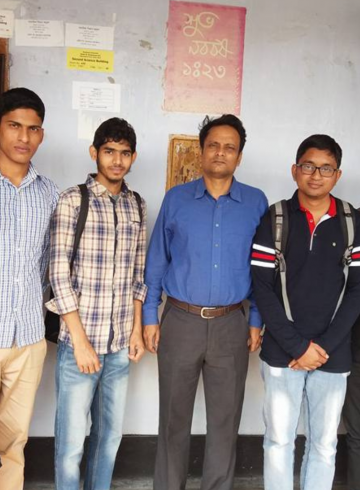Ice cream & A Humble Tribute to Dr. Khaled Hossain
Professor Khaled's impact extended beyond the classroom.

In the year 2016, I was a sophomore student in my home country. During that time, I came across a course titled ‘Nutritional Biochemistry’ that immediately caught my interest. The course seemed promising as it would provide knowledge about the biochemistry of food (e.g., ice cream), something I had always been curious about and believed would be applicable to real life.
Our Nutritional Biochemistry class took place once a week at the Biochemistry department. There were two teachers responsible for the course, and one of them focused on teaching us about the structural biochemistry of food, including carbohydrates, proteins, lipids, and vitamins. While he was a cool teacher, he had a habit of frequently mentioning his wife during class, expressing his deep affection for her. Although we enjoyed his lectures, some of my classmates and I would sometimes tease him by playfully imitating his repetitive phrase, “Tomader Vabi” (Your Madam), whenever he mentioned his wife.
However, the purpose of this blog is to highlight the second teacher of the course, Professor Khaled Hossain. He quickly became one of my favorite teachers, not only for his intelligence but also for his extraordinary qualities. Professor Khaled was a renowned researcher in Bangladesh, specializing in arsenic and environmental science. He had received multiple accolades from the Bangladesh government for his significant contributions to the field. However, to us, he was more than just a teacher. He became a mentor, an older brother figure, and sometimes even a caring but strict father.
What made Professor Khaled stand out was his unconventional teaching approach. He did not adhere to traditional teaching strategies but instead believed in engaging with his students during his lectures. Right from the beginning, he made it clear that attendance marks were meaningless to him. He emphasized that our presence in his class should stem from genuine interest rather than a mere pursuit of attendance grades. Surprisingly, throughout the entire academic year, hardly any student was absent during his lectures. His ability to connect with students and provide them with the most up-to-date knowledge was commendable. He often shared the latest survey results and current discoveries from peer-reviewed articles, ensuring that we received the most relevant and applicable information.
However, Professor Khaled’s teachings went beyond academic knowledge. He frequently delved into discussions about ethics and the moral dilemmas prevalent in society. His goal was to enhance our philosophical and moral development by posing thought-provoking questions. He firmly believed that a smart professor could shape smart graduates. Professor Khaled recognized the immense responsibility teachers held in shaping the minds of their students and expressed his disappointment with the education system’s shortcomings.
During his classes, I always made sure to sit at the front and actively participate in discussions, whether they were philosophical or biochemical in nature. Professor Khaled’s teachings resonated deeply with me and my classmates, making him an idol, a true hero in our eyes. It was rare to find a teacher universally adored by every student in a class.
Professor Khaled’s impact extended beyond the classroom. He challenged societal norms and stereotypes, particularly in regard to sexuality. He fearlessly addressed hormonal changes in both male and female students, urging us to understand reproductive biology and its implications for our well-being. He even discussed topics such as the menstruation cycle and provided guidance on suitable food choices during that time. Although these discussions could sometimes make us uncomfortable, they expanded our mental boundaries and fostered understanding among us.
Towards the end of our Nutritional Biochemistry course, Professor Khaled dedicated a lecture to the topic of ice cream. He explored the process of ice cream preparation, its nutritional value, and the growing global market for this beloved dessert. Additionally, he delved into the psychological reasons behind people’s love for ice cream. As he concluded the lecture, he shared a personal recommendation: for those of us who would pursue higher studies in Europe, he urged us not to miss the opportunity to experience the taste of Haagen-Dazs ice cream. He mentioned that it had been his favorite ice cream during his Ph.D. studies in Europe, despite it being originally produced by an American company.
Six years later, in 2022, I find myself living in Paris. The recommendation from Professor Khaled about Haagen-Dazs ice cream had slipped from my memory. However, as fate would have it, while shopping for groceries in a mall, my eyes were drawn to the words ‘Haagen-Dazs’. Memories of Professor Khaled flooded back, and I felt a wave of nostalgia. I checked the price, and it was noticeably higher than regular ice cream, almost double the price. But my longing for ice cream, coupled with the nostalgia of Professor Khaled’s recommendation after a long winter in Paris, compelled me to purchase the renowned Haagen-Dazs.
A few hours ago, I savored every aspect of it with all my senses. It was absolutely delightful, surpassing any ice cream experience I had ever had before. The convergence of my expectations, nostalgia, and the release of serotonin created an unforgettable moment. The life goal I had set six years ago, within the confines of the Rajshahi University’s biochemistry building, had truly been accomplished. Haagen-Dazs is not only delicious as an ice cream but also represents the essence of Dr. Khaled’s teachings and his impact on our lives.
Both Haagen-Dazs and Professor Khaled are unparalleled and timeless. They hold a special place in my heart, symbolizing the pursuit of knowledge, the joy of indulgence, and the profound influence of an exceptional teacher.
